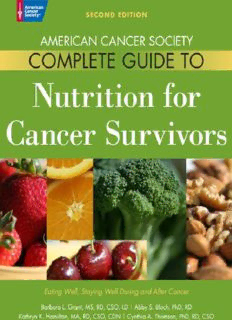
American Cancer Society Complete Guide to Nutrition for Cancer Survivors: Eating Well, Staying Well During and After Cancer PDF
Preview American Cancer Society Complete Guide to Nutrition for Cancer Survivors: Eating Well, Staying Well During and After Cancer
SECOND EDITION AMERICAN CANCER SOCIETY COMPLETE GUIDE TO Nutrition for Cancer Survivors Published by the American Cancer Society / Health Promotions 250 Williams Street NW, Atlanta, Georgia 30303-1002 Copyright ©2010 American Cancer Society All rights reserved. Without limiting the rights under copyright reserved above, no part of this publication may be reproduced, stored in or introduced into a retrieval system, or transmitted in any form or by any means (electronic, mechanical, photocopying, recording, or otherwise) without the prior written permission of the publisher. For permission to reprint any materials from this publication, contact the publisher at [email protected] . Printed in the United States of America Design and composition by LaShae V. Ortiz Indexing by Bob Land 5 4 3 2 1 10 11 12 13 14 Library of Congress Cataloging-in-Publication Data American Cancer Society complete guide to nutrition for cancer survivors : eating well, staying well during and after cancer / Barbara Grant … [et al].—2nd ed. p. cm. Rev. ed. of: Eating well, staying well during and after cancer. c2004. Includes bibliographical references and index. ISBN-13: 978-0-944235-78-2 (pbk.: alk. paper) ISBN-10: 0-944235-78-6 (pbk.: alk. paper) 1. Cancer—Nutritional aspects. 2. Cancer—Diet therapy. I. Grant, Barbara (Barbara L.), 1958- II. American Cancer Society. III. Eating well, staying well during and after cancer. IV. Title: Complete guide to nutrition for cancer survivors. RC268.45.E285 2010 616.99’40654—dc22 2009050656 AMERICAN CANCER SOCIETY Strategic Director, Content: Chuck Westbrook Director, Cancer Information: Terri Ades, DNP, FNP-BC, AOCN Director of Nutrition and Physical Activity: Colleen Doyle, MS, RD Director, Book Publishing: Len Boswell Managing Editor, Books: Rebecca Teaff, MA Books Editor: Jill Russell Book Publishing Coordinator: Vanika Jordan, MSPub Editorial Assistant, Books: Amy Rovere Quantity discounts on bulk purchases of this book are available. Book excerpts can also be created to fit specific needs. For information, please contact the American Cancer Society, Health Promotions Publishing, 250 Williams Street NW, Atlanta, GA 30303-1002, or send an e-mail to [email protected] . A NOTE TO THE READER The treatment information in this book is not official policy of the American Cancer Society and is not intended as medical advice to replace the expertise and judgment of your cancer care team. It is intended to help you and your family make informed decisions, together with your doctor. For more information about cancer, contact your American Cancer Society at 800-227-2345 or cancer.org . CONTENTS INTRODUCTION 1. Healthy Eating What Is a Healthy Diet? Maintaining a Healthy Weight Adopting a Physically Active Lifestyle Consuming a Healthy Diet Limiting Alcohol The Components of a Balanced Diet Protein Carbohydrates Fat What About Calories? Vitamins and Minerals Water RDAs, DRIs, AIs, and ULs: Learning the Language Your Nutritional Goals—During and After Treatment Getting Adequate Nutrients Staying Active 2. Making Informed Decisions Talk to the Experts Getting the Facts: Reliable Research Understand the Study Types Study the Claims 3. Hot Topics in Nutrition and Cancer Evaluating Foods as Part of the Overall Diet Coffee Flaxseed Garlic Ginger Green Tea Omega-3 Fatty Acids (Fish, Fish Oil, and Legumes) Soy Vegetables and Fruits Broccoli (and Other Cruciferous Vegetables) Shiitake Mushrooms Tomatoes and Lycopene Noni Plant Berries (Ellagic Acid) Phytochemical Power Polyphenols, Flavonoids, and Phytoestrogens Antioxidants Carotenoids and Anthocyanins Sulfides 4. How Food Is Grown and Treated Pesticides Are Pesticides Safe? Fruit and Vegetable Washes Genetically Modified Foods Are Genetically Modified Foods Safe? Food Additives Are Food Additives Safe? Irradiated Foods Are Irradiated Foods Safe? Organic Foods Are Organic Foods Safe? Labeling Organic Foods 5. Dietary Supplements: Vitamins, Minerals, and Herbs Dietary Supplements Vitamin and Mineral Supplements Antioxidant Supplements Herbal Supplements Risks of Dietary Supplements Dietary Supplements Can Interfere with Medications The “Natural Is Safe” or “Natural Is Better” Myth Regulation of Dietary Supplements Good Manufacturing Practices Claims: What They Mean and Don’t Mean 6. Diet and Nutrition Therapies Promoted as Treatments and Cures Diet Therapy Promoted to Improve Immune Function Livingston-Wheeler Therapy Diet Therapies Promoted to Remove Toxins and Strengthen the Body’s Defenses Metabolic Therapy Regimens Other Diets Promoted to Treat or Cure Cancer Vegetarian Diets Macrobiotic Diet Fasting and Juicing 7. Preparing for Cancer Treatment Planning Ahead—Meal Preparation When Others Offer to Help Food Shopping Stocking the Refrigerator and Pantry Cooking for Yourself or Others Planning Ahead for Cancer Treatment and Related Side Effects Surgery Radiation Therapy Chemotherapy Biotherapy Hormonal Therapy 155 Cancer, Healthy Eating, and the Family Nutrition-Related Coping Tips for Caregivers 8. Maintaining a Healthy Body Weight Why Body Weight Is Important What Is a Healthy Weight? Weight Loss Coping with Weight Loss How to Increase Calories How to Increase Protein Weight Gain Coping with Weight Gain Ways to Cut Back on Calories Other Causes for Weight Fluctuations Fluid Retention and Weight Gain Dehydration and Weight Loss When to Call the Doctor Are You Getting Enough Calories and Protein? 9. Coping with Treatment-Related Fatigue Understanding Fatigue Reasons for Fatigue 183 Coping with Fatigue Other Ways to Cope with Fatigue 10. Strengthening Your Immune System Cancer Treatments’ Effects on Your Immune System Surgery Chemotherapy Biotherapy Radiation Therapy Food Safety Guidelines and Your Immune System
Description: